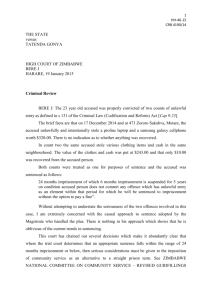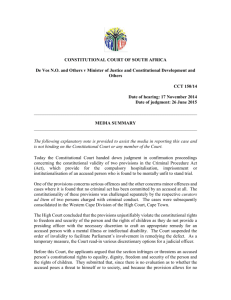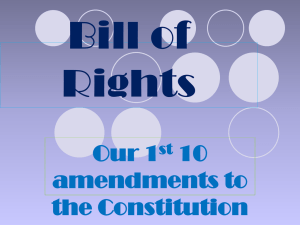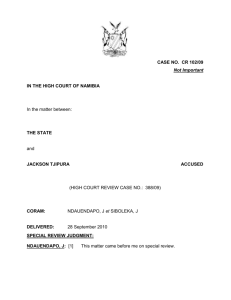HH 370-15
advertisement
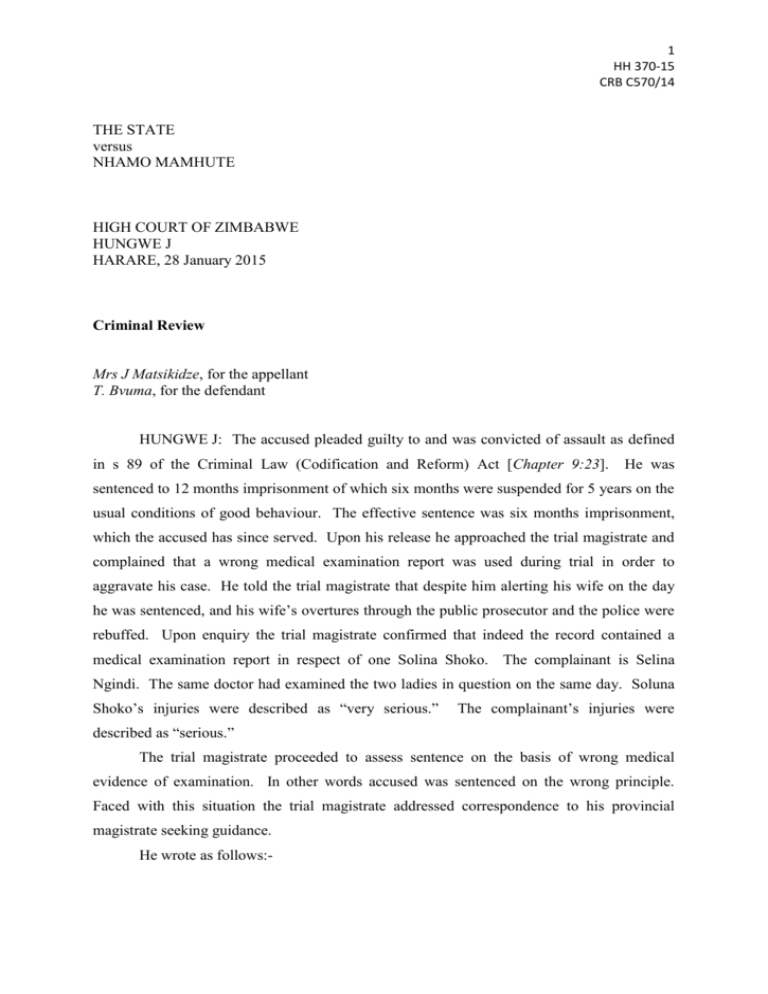
1 HH 370-15 CRB C570/14 THE STATE versus NHAMO MAMHUTE HIGH COURT OF ZIMBABWE HUNGWE J HARARE, 28 January 2015 Criminal Review Mrs J Matsikidze, for the appellant T. Bvuma, for the defendant HUNGWE J: The accused pleaded guilty to and was convicted of assault as defined in s 89 of the Criminal Law (Codification and Reform) Act [Chapter 9:23]. He was sentenced to 12 months imprisonment of which six months were suspended for 5 years on the usual conditions of good behaviour. The effective sentence was six months imprisonment, which the accused has since served. Upon his release he approached the trial magistrate and complained that a wrong medical examination report was used during trial in order to aggravate his case. He told the trial magistrate that despite him alerting his wife on the day he was sentenced, and his wife’s overtures through the public prosecutor and the police were rebuffed. Upon enquiry the trial magistrate confirmed that indeed the record contained a medical examination report in respect of one Solina Shoko. The complainant is Selina Ngindi. The same doctor had examined the two ladies in question on the same day. Soluna Shoko’s injuries were described as “very serious.” The complainant’s injuries were described as “serious.” The trial magistrate proceeded to assess sentence on the basis of wrong medical evidence of examination. In other words accused was sentenced on the wrong principle. Faced with this situation the trial magistrate addressed correspondence to his provincial magistrate seeking guidance. He wrote as follows:- 2 HH 370-15 CRB C570/14 RE: S V NHAMO MAMHUTE Attached is a record in respect of S v Nhamo Mamhute. This accused appeared before me and I convicted him on his plea. I then sentenced him to 12 months imprisonment and suspended 6 months on usual conditions of good behaviour. 6 months imprisonment was effective. The accused served 4 months after ⅓ was suspended by Prison Service. Upon his release accused came to me complaining that a wrong medical report was used to aggravate his case. I checked the record and indeed found out that the actual medical report did not warrant a custodial sentence. The medical report that was used indeed reflects the name of Soluna instead of Selina Ngindi. I did not notice this anomaly. From what the accused told me he alerted Prosecution through his wife on that very day and was turned away. He made several attempts through the police without success. He only came to me after it was too late. I know the effect is irreversible, but I am of the view that the record be placed before a Judge for direction. I really do not know how I failed to notice this anomaly. I actually wrote my reasons for sentence genuinely believing I am using the correct document.” In S v Beatrice 1983 (2) ZLR 305 this court had occasion to deal with, in a review, a matter in which the trial court sentenced an accused on the basis of facts which did not appear on the record. The present case is quite the opposite. The accused was sentenced on the basis of the wrong facts which were smuggled into the record by the State. The medical report pointed a grave type of assault as compared with the actual facts. Consequently, the trial magistrate proceeded to assess sentence on a wrong principle. He admits that he would have imposed a fine if the correct affidavit had been placed before him. This irregularity ought to be corrected by quashing the sentence wrongly assessed and making an order that the accused be recalled for sentencing afresh. However, subjecting the accused to another court appearance, in my view, will only serve to further unfairly traumatize him, since he has served the six months imprisonment. A fairer alternative in my view is for this court to quash the sentence and assess the appropriate sentence afresh. The sentence imposed by the court a quo is therefore quashed. The accused pleaded guilty. He is a first offender. He has already served six months imprisonment. On the other hand he had assaulted an innocent person who was trying to make peace between him and her mother: The injuries sustained, although described as serious, are in fact moderate and did not require hospitalisation. As such a heavy fine would have adequately met the justice of this case. In the result, the accused is sentenced as follows:- 3 HH 370-15 CRB C570/14 “$100 or six months imprisonment.” The trial magistrate is to ensure that the alteration of the sentence is brought to the accused’s attention. Since he has served the six months imprisonment, he does not have to pay the fine. MANGOTA J agrees:………………………….
